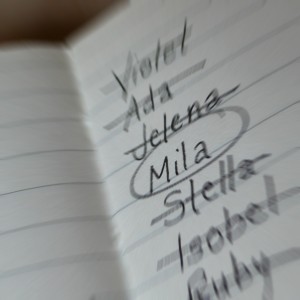 Sometimes we play a game with our daughter. “What if we named you…Stella?” we ask. She laughs and wrinkles her nose. “No, I’m Mila!” “Hmm. What if we named you…Ruby?” More giggles. “No, I’m not Ruby! I’m Mila!” And she is. She is Mila. I can’t imagine her as anything else. At least…I can’t now.
Sometimes we play a game with our daughter. “What if we named you…Stella?” we ask. She laughs and wrinkles her nose. “No, I’m Mila!” “Hmm. What if we named you…Ruby?” More giggles. “No, I’m not Ruby! I’m Mila!” And she is. She is Mila. I can’t imagine her as anything else. At least…I can’t now.
I wasn’t sure, at first, when my husband suggested the name Mila for our daughter whether it really met all my baby-naming criteria. Oh, it was old. A famous Croatian, Mila Gojsalic, considered by some to be a sort of Croatian Jeanne d’Arc for her role in saving the region from a Turkish invasion, bore the name in the 16th century. I had wanted an old name, something with a bit of history to it. Check!
I also wanted a name that would reflect our daughter’s ethnic heritage. And I wanted it to mean something good, something positive. Her father is half Croatian. And here was a Croatian name. The word itself actually means “dear.” Check! Check!
But, while I wanted a name that was uncommon, something she wouldn’t have to share with half her kindergarten class, I also wanted it to be recognizable, familiar enough that she wouldn’t have to be always explaining it, that she wouldn’t have to be always correcting mispronunciations. I had my doubts about the name in that regard.
As I say, my daughter is Mila now. I love the name and can’t imagine her with any other. And while we do, as I feared, deal with nurses at her pediatrician’s office calling her Myla (it’s pronounced Meela) or new acquaintances greeting her with the more common Mia, I’ve actually been pleasantly surprised by the conversations that have been sparked by Mila’s name with many people we’ve met beyond the boundaries of our Midwest suburb. While not so familiar in our own neighborhood, Mila is a name that has found use in many other countries and cultures. We’ve met, or met relatives of, Milas who are Filipina, Guatemalan, Bulgarian, Dutch…. Conversations that have started and might have ended with, “Oh, she’s so cute. What is her name?” have turned into explorations of family history, personal and historical events, even language and etymology.
“Mila!? That’s my name!” (Or, “my sister’s name!”) “It is short for Milagros. It means ‘miracle.'”
Or, “What a beautiful name. In Bulgarian, Mila means ‘darling.’ Please, may I give her a cookie?” This woman, gazing fondly and a little sadly at Mila, later shared how much she was reminded by her of her own little daughter, from whom she was separated by the Iron Curtain many years ago.
These points of connection, and others, have been a means to learning about other people, other languages, other life experiences. And these opportunities to learn have more than made up for the Mylas and Mias we’ve had to correct along the way. Aside from the fact that she just couldn’t be anything but Mila, our dear Mila, I’ve lost any doubts I once had about our daughter’s name in my appreciation for its cross-cultural appeal, for its ability to bridge borders by simply being a tiny little bit of common ground.
And anyway, just try to call her anything else – she’ll soon set you straight: “I’m Mila!”
